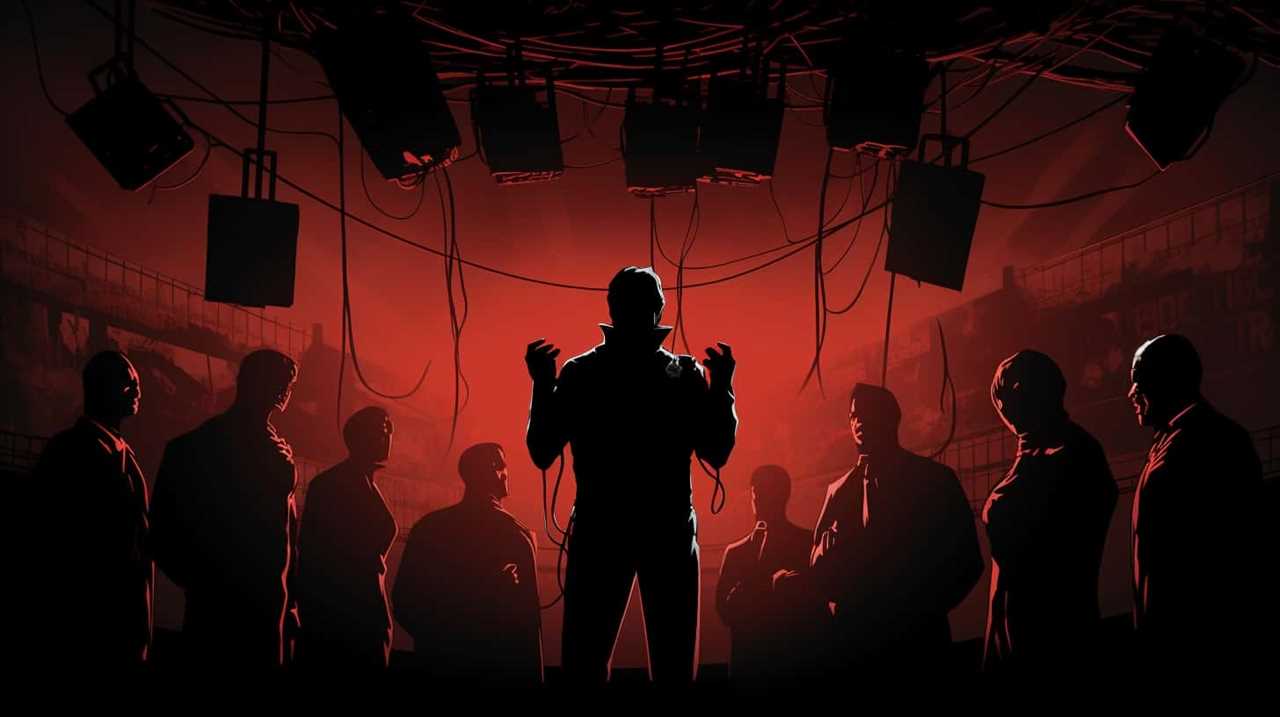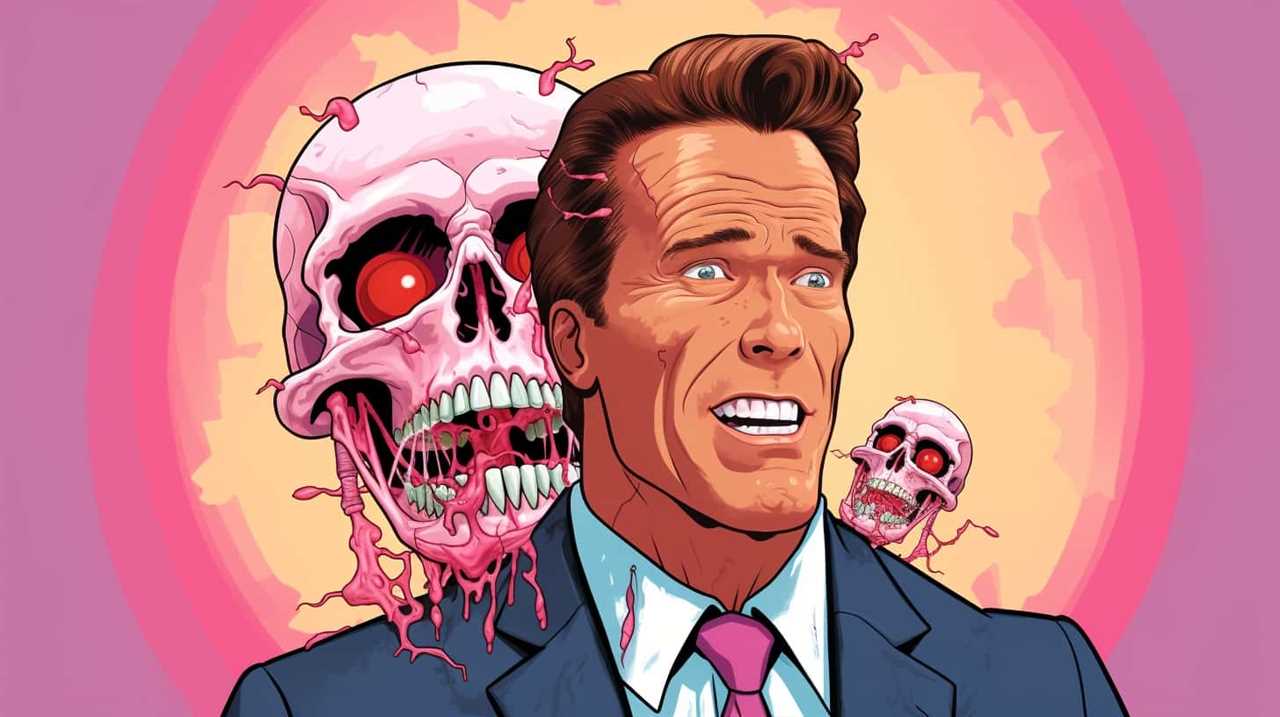Hello, movie buffs! Are you ready to delve into the dark and intricate minds of some of the most legendary villains in cinematic history? Stay tuned, because I have a special treat for you today.
In this article, we’ll be exploring the top 5 villain monologue quotes in movie history. From the chilling words of the Joker in ‘The Dark Knight’ to the bone-chilling eloquence of Hannibal Lecter in ‘The Silence of the Lambs,’ get ready to be captivated by the sinister genius of these iconic characters.
And don’t worry, we won’t be spoiling any plot twists or revealing the ending – it’s all about the power of their words.
So, let’s dim the lights, grab some popcorn, and prepare to be enthralled by the dark side of cinema.

Key Takeaways
- Iconic villain performances, such as Heath Ledger’s Joker in The Dark Knight, Anthony Hopkins’ Dr. Hannibal Lecter in The Silence of the Lambs, and Samuel L. Jackson’s character in Pulp Fiction, have redefined and set new standards for villainous characters in movies.
- Villain monologues in films often explore deep psychological insights and challenge societal norms and values, provoking introspection and forcing the audience to question morality.
- Villains manipulate emotions and appeal to a sense of duty to achieve their goals, as seen in Gollum’s manipulation of Frodo in The Lord of the Rings: The Return of the King and Colonel Jessup’s jury manipulation in A Few Good Men.
- Villain monologues touch on universal themes such as power, corruption, morality, the constant battle between good and evil, personal sacrifice, resilience, and the ability to confront one’s weaknesses, provoking reflection on the human condition and the choices we make.
The Dark Knight
In my opinion, one of the most memorable villain monologues in movie history can be found in ‘The Dark Knight’. Heath Ledger’s performance as the Joker was nothing short of extraordinary, leaving an indelible impact on audiences worldwide. The Joker’s iconic lines have become ingrained in popular culture, with quotes like ‘Why so serious?’ and ‘I believe that whatever doesn’t kill you simply makes you…stranger’ resonating long after the movie’s release.
Ledger’s portrayal of the Joker was a revelation, defying all expectations and redefining the character for a new generation. His performance was chilling, captivating, and disturbingly mesmerizing. The way he delivered his lines with a twisted sense of humor and an unpredictable nature showcased his immense talent as an actor.
The impact of Ledger’s performance goes beyond the movie itself. His portrayal of the Joker set a new standard for villainous characters, elevating the genre to new heights. It inspired future actors and filmmakers to push boundaries and explore the darker, more complex aspects of their characters.
The Silence of the Lambs
While watching ‘The Silence of the Lambs’, I was captivated by the villain’s monologue. This psychological thriller, directed by Jonathan Demme and released in 1991, features one of the most iconic performances in movie history by Anthony Hopkins as the brilliant and manipulative serial killer, Dr. Hannibal Lecter.

In this chilling scene, Dr. Lecter is confined to a glass cell, yet his words hold a power that transcends his physical limitations. As he engages in a conversation with Clarice Starling, an FBI trainee played by Jodie Foster, he delves into the depths of her psyche, carefully probing and dissecting her motivations and vulnerabilities. Through his masterful manipulation, he exposes not just the darkness within Clarice, but also the darkness that lurks within all of us.
To highlight the brilliance of this monologue, I have provided a table below that showcases the psychological insight and impact of Dr. Lecter’s words:
| Insight | Impact |
|---|---|
| Uncovering hidden fears and insecurities | Creates a sense of unease and tension |
| Challenging societal norms and values | Forces the audience to question morality |
| Revealing the complexities of human nature | Provokes deep introspection |
| Playing mind games with the protagonist | Heightens suspense and psychological drama |
| Establishing Dr. Lecter’s dominance | Establishes him as a formidable adversary |
Through his chilling monologue, Anthony Hopkins delivers a performance that has left an indelible mark on cinema. The psychological depth and complexity of Dr. Lecter’s character, combined with Hopkins’ captivating portrayal, make this scene a standout moment in movie history. ‘The Silence of the Lambs’ continues to be celebrated as a masterpiece of psychological thriller, thanks in large part to Hopkins’ iconic performance as the unforgettable Dr. Hannibal Lecter.
Pulp Fiction
One of my favorite villain monologues in movie history comes from ‘Pulp Fiction’. Quentin Tarantino’s directorial style shines through in this iconic film, as he explores deep symbolism and themes.

- Symbolism and Themes: ‘Pulp Fiction’ is rife with symbolism, from the mysterious briefcase to the golden glow that emanates from it. Tarantino uses these symbols to create an air of intrigue and mystery, keeping the audience engaged throughout the film.
- Quentin Tarantino’s Directorial Style: Tarantino is known for his nonlinear storytelling, and ‘Pulp Fiction’ is a prime example of this. The film jumps back and forth in time, creating a sense of disorientation that adds to the overall tension and unpredictability. Tarantino’s unique blend of dark humor, violence, and pop culture references also make ‘Pulp Fiction’ a memorable viewing experience.
In the film, the character of Jules Winnfield delivers a powerful monologue known as ‘Ezekiel 25:17.’ This monologue showcases the complex moral code of a hitman questioning his own actions, while also exploring themes of redemption and divine intervention. The combination of Tarantino’s direction and Samuel L. Jackson’s mesmerizing performance make this monologue a standout moment in cinematic history.
The Lord of the Rings: The Return of the King
Moving on to ‘The Lord of the Rings: The Return of the King’, I must say that this film delivers another powerful villain monologue that leaves a lasting impact.
One of the most fascinating aspects of this movie is the effectiveness of Gollum’s manipulation tactics. Throughout the story, Gollum uses his cunning and deceitful ways to manipulate Frodo, the protagonist, into doing his bidding. By exploiting Frodo’s vulnerabilities and insecurities, Gollum plants seeds of doubt and fear, gradually eroding Frodo’s trust in his loyal companion, Sam. This manipulation ultimately leads to Frodo’s isolation and descent into darkness, as he becomes increasingly susceptible to Gollum’s influence.
The symbolism of Frodo’s journey also adds depth to the film’s narrative. Frodo, burdened by the weight of the One Ring, represents the struggle against temptation and the corrosive power of evil. His journey becomes a metaphor for the internal struggles we all face in the face of adversity. As Frodo battles with the influence of the Ring, his resolve is tested, and he must confront his own weaknesses and make difficult choices. This symbolism highlights the universal themes of personal sacrifice, resilience, and the constant battle between good and evil.

A Few Good Men
‘A Few Good Men’ features a powerful villain monologue that captivates audiences with its intense delivery and thought-provoking message. In this iconic courtroom drama, Colonel Nathan Jessup, played by Jack Nicholson, delivers a monologue that explores the ethical dilemmas surrounding jury manipulation.
- Jury manipulation: Colonel Jessup cunningly manipulates the jury by appealing to their emotions and sense of duty. He skillfully presents himself as a defender of the nation, appealing to the jurors’ patriotism and loyalty.
- Ethical dilemmas: The monologue raises important ethical questions. Should the ends justify the means? Is it acceptable to manipulate the truth for the greater good? Colonel Jessup’s words force the audience to confront these complex moral dilemmas.
- Intense delivery: Nicholson’s performance is mesmerizing. His commanding presence and forceful delivery intensify the impact of the monologue. The audience is left questioning their own beliefs and grappling with the difficult choices presented.
Frequently Asked Questions
What Is the Overall Plot of the Dark Knight?
In "The Dark Knight," Batman’s moral dilemmas are explored as he battles against the chaotic reign of the Joker. The overall plot centers around their intense cat-and-mouse game, delving into themes of heroism, morality, and the blurred line between good and evil.
Who Are the Main Characters in the Silence of the Lambs?
In "The Silence of the Lambs," the main characters are Clarice Starling, Hannibal Lecter, and Buffalo Bill. The psychological dynamic between Clarice and Hannibal is intriguing, while Buffalo Bill’s motives and psychology add depth to the story.
Can You Explain the Timeline of Events in Pulp Fiction?
Sure, I can explain the timeline of events in Pulp Fiction. It’s a nonlinear narrative that intertwines various stories and characters. The key events include a botched robbery, a mysterious briefcase, and the character’s motivations drive the plot.

What Is the Significance of the Ring in the Lord of the Rings: the Return of the King?
The ring in "The Return of the King" symbolizes power and corruption. Frodo’s journey to destroy it highlights the importance of sacrifice and the struggle against evil. It’s a powerful symbol of the battle between good and evil in the story.
Who Are the Key Players in the Courtroom Drama of a Few Good Men?
In the courtroom drama of A Few Good Men, the key players are the defense and prosecution attorneys, the judge, and the witnesses. The courtroom dynamics are intense, with dramatic interrogations driving the narrative forward.
Do the Top 5 Villain Monologue Quotes in Movie History also appear in the 15 Unforgettable Villain Monologues in Movie History list?
Yes, some of the top 5 villain monologue quotes in movie history also appear in the 15 unforgettable villain monologues in movies list. These quotes have left a lasting impact on audiences and are often referenced in popular culture. They showcase the power and influence of unforgettable villain monologues in movies.
Conclusion
In conclusion, these villain monologue quotes in movie history have left a lasting impact on audiences, showcasing the power of words and the brilliance of the actors delivering them.
From The Dark Knight’s chilling ‘Why so serious?’ to The Silence of the Lambs’ bone-chilling ‘I ate his liver with some fava beans and a nice Chianti,’ these lines have become iconic in their own right.

So, the next time you find yourself enthralled by a villain’s monologue, remember to appreciate the artistry behind their cunning words.









